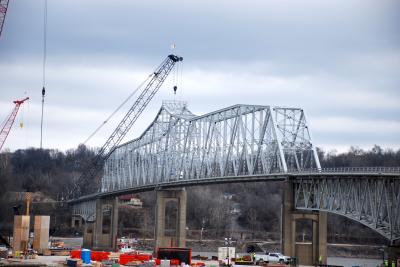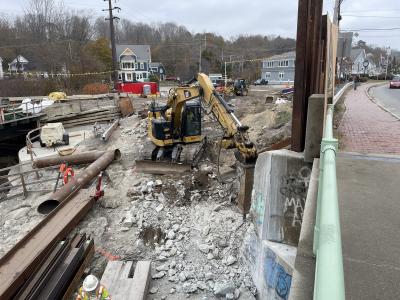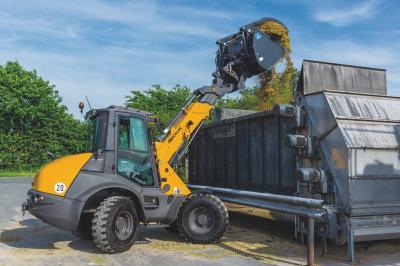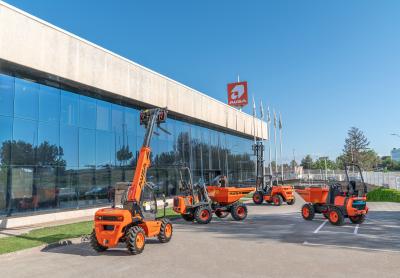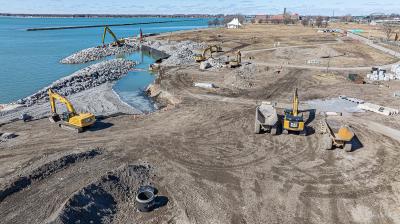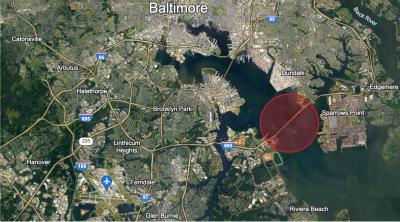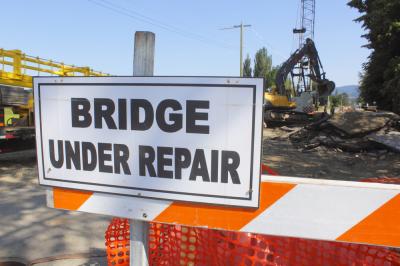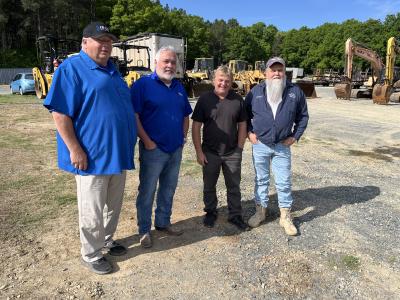When it comes to equipment sales, the staff at Tar Heel Machinery believes no matter the machine or its condition, someone will purchase it if the price is right.
“A global economy is very diversified and every machine will eventually find a home,” explained Scott Woody, who founded the company in 2005 with partner/owner Penn McMichael.
“We believe there’s a buyer for every machine, we just have to get it in front of them,” McMichael pointed out. “Tar Heel Machinery has buyers on every continent of the world except the uninhabitable frozen Antarctica. However, most machines are sold right here in the United States to other contractors. Also, other used equipment dealers and even Cat, Komatsu, Deere, Case and Volvo dealers buy machines from Tar Heel Machinery for their rental or used equipment fleets.
“These same worldwide contacts also supply us with quality machines that we pass on to our customers both here and abroad. Our customers trust us to make sure the machine they are getting through us will be exactly as represented with no surprises when they receive it. That keeps buyers coming back.”
A heavy equipment company based on the principles of honesty, trust and long-term relationships, Tar Heel Machinery maintains locations in both Raleigh and Reidsville, N. C. A large part of the business is brokering machines for customers, both buying and selling.
“With our marketing skills, great reputation and thousands of contacts worldwide, Tar Heel Machinery can get it done,” said McMichael. “When our customers want to sell an excess piece or an entire fleet, Tar Heel Machinery has the expertise to get the machines sold for them. We simply know how to move iron. After we perform a good inspection, we have the know-how to market a specific machine in a specific market so it gets sold.”
According to Woody, “Our sales staff must consult and work with customers on rental needs because of the specifications needed to put the right machine on the right job. Their scope of work, the soil conditions and environment they work in, the obstacles they face with regards to surface and underground conditions including forestation, rock, structures, wetlands, etc. and the ever-increasing environmental concerns on different job sites are just a few factors in deciding the right equipment for the job.
“For grading, excavating, pipe, clearing/demolition or environmental jobs you have to consider the quantity of material that needs to be moved, the time frame involved, how far it is to be moved/transported, the type of material being excavated, how deep the dig and the ground pressure restrictions of the material being transported. Unlike straight brokering/selling machines, we cannot buy or own a generic fleet or rental machines to satisfy our local/regional contractors. Because we must look back historically at local needs and regional development, our sales staff’s experience is second to none in our area, but we must also look at the scope of work coming up in the future to tailor our fleet to constantly change with the need.
Although the feeling at Tar Heel Machinery is that, based on the scope of the work that is becoming available, the economy is slowly improving and become more stable, there is still some hesitation amongst contractors to buy brand-new equipment.
“There are a few factors,” Woody explained, “that are slowing contractors from flooding back to buying brand-new machines from the OEM dealers. The first is that many contractors downsized in the lean times, keeping most of the least expensive machines in their fleet over the last few years and have not really increased their fleets back to meet the demand of work. There is a reluctance to let fleet size build to the point where you have to keep it all busy, all the time, and allow it to determine your scope of work anymore.
“Contractors seem to be cautious of the work and the goodwill of the economy and are being conservative about equipment purchases right now, and are purchasing differently and renting to fill in the gaps,” Woody added. “When they do buy machines, lots of contractors have changed from their ordinary buying patterns of purchasing new machines from the dealers and are choosing to buy used instead for more units with less overall debt and quicker resale if needed to get out of certain machines. They are also buying used, sometimes out of necessity, to start a job because of lack of quick supply.
“Because so many contractors got rid of debt over the last few years by selling off newer units, turning in lease machines and either keeping, or buying more used machines, there is a definite increase in the need for parts and components to fix these units. There was a decrease in overall ownership cost, but inevitably an increase in operating cost of units that were older and most were much cheaper to rebuild and keep running than purchasing new.”
Al Murray, who started at Tar Heel Machinery in March 2012, has 27 years experience with a Deere dealer and devised a department within the company that offers an option to help customers lower the operating cost of their equipment.
“This was a perfect fit,” Murray said. “Offering the option of parts to our customer base allows us an opportunity to establish a deeper relationship as well as expanding our business beyond just the sale of the equipment. We offer new OEM parts at a price competitive to or below the OEM dealer in most cases. We also provide used and remanufactured components at a substantial savings to the customer when the age of the equipment dictates.”
Said Murray, “Sourcing the right part and price is a time-consuming task and overseeing from start to delivery is sometimes tense to make a timely transaction. Secondly, the job may vary from service or repair to a machine down situation which demands ASAP response. Being able to offer customers a solution that solves their problems at a lower cost is a win/win situation for them, as well as our reputation in the marketplace. Price and availability is probably the most important, as is time of delivery.”
According to Tar Heel Machinery rental manager Randy Barrett, increasing inventory clearly benefits customers.
“It gives us better opportunities to supply our customers’ needs with low-hour, late-model equipment at affordable pricing. We also offer specialty pieces, such as long-reach excavators and tracked dump trucks. By doubling our fleet, it has made our service department very busy, and they have done a great job adjusting and stepping up to the plate.”
Jay Sellers, who works in sales and rentals said it was vital for Tar Heel Machinery to double its rental fleet to meet the growing rental demands of customers.
“With so much economic uncertainty, many customers sold off their own equipment and prefer the rental option. There was a time customers could buy equipment based on work load and have a general idea of what their machines would be worth two years down the road. Now many cannot guarantee they will have the work to keep them busy.
“Tar Heel Machinery also has established some very good relationships with other rental companies and frequently helps to subsidize their fleet,” Sellers continued. “Since our increase in fleet size, we have been able to initiate additional business with some of the larger customers in our area, as well. We are about two months into our fleet increase and have had a very positive reaction from the customers we serve. Many of our clients see our fleet increase as an investment in the future. With rental demand on the rise, being able to provide additional equipment is vital to our company growth.
“We have tried to match our fleet to the current weak spots in our regional market. Being able to provide specialized equipment like long reach excavators, tracked dump trucks, big dozers, articulated dump trucks, and 100 thousand pound excavators has enabled our customers to rent local without having to go greater distances to find the niche pieces they may need.
“Tar Heel Machinery can only be as successful as our customer base,” added Sellers. “It’s vital that we as a company position ourselves to meet the current and future rental demands. We are dedicated to providing great equipment at a fair price and ensuring our clients return as happy repeat customers.”
Sales and rentals colleague David Vendemia pointed out, “I’ve been in the rental business in North Carolina for 15 years. Being able to adjust your inventory quickly is best for both you and your customers. You get the return you’re looking for and they get the machine they need. If the demand or the return is not there then, don’t supply them in your inventory.
“Most companies stock the same gear year-in and year-out. Companies change what they do for work in our business pending profitability and that is key to survival in this recent market trend. Some guys starting out clearing, then they subcontract it out, now they are back clearing their own sites again. Owning your equipment and not having your equipment own you is the key to building a rental fleet or any fleet at all. The challenge for us is to find a nice machine that is affordable to add into your rental fleet at the current rental rates in the market. At the end of the day if something occurs to halt your work progress, all you have is your iron, take care of it.”
The Tar Heel Machinery team also includes Service Manager Don White, Field Service Technician Michael Pope and Office Manager Amy Pope. She believes perseverance, diligence and a positive attitude are key in effectively operating their facilities.
“I work with an amazing group of people,” said Pope, whose responsibilities include billing, sales, rentals, logistics, safety and customer service. “We’re like a family. They are always telling me in one way or another that I am the glue that holds everything together, and that keeps me motivated to live up to those words. I’m always expecting the unexpected, and willing to do what it takes to keep it all going.”
Pope also realizes keeping up with the times is crucial to surviving in the current economy.
“In today’s technology-savvy world, I have to be able to access information in a moment’s notice. I think by the office being organized and running smoothly, the guys in the shop and the salesmen in the field are able to take care of our customers. Customer service is extremely important.
“Some of our customers are half a world away, and the only communication is by phone or email,” explained Pope. “They’re making an investment and with that can sometimes come apprehension, especially when you can’t see or put your hands on something you’re putting your hard earned money into. Regardless how near or far, a customer’s needs are our top priority. We want their experience with us to far exceed their expectations. Being attentive to detail, knowledgeable about the facts and having a reliable procedure in place assures that our customers know that they are important and that we are here for and because of them.”
Today's top stories



